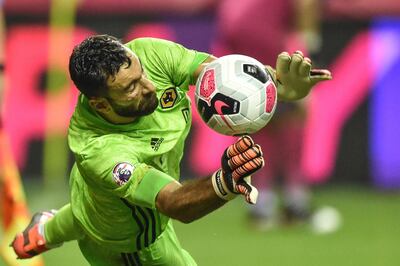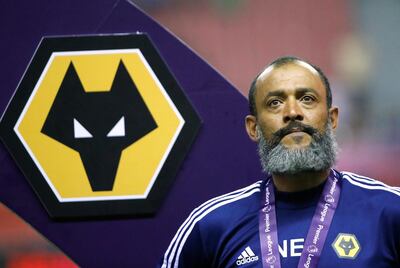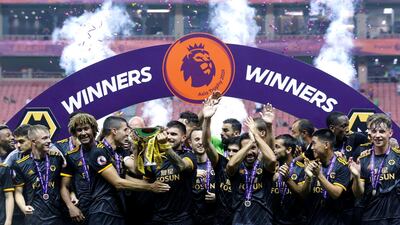It is 14,176 days since Wolverhampton Wanderers played their last match in a European competition. So expect a special frisson around Molineux on Thursday, albeit in an incongruous high-summer setting and against opposition that are not so obviously exotic. Wolves versus Crusaders, a Northern Irish club, is a tie with an expected outcome, the Premier League club clear favourites to progress to next month’s third qualifying round of the Europa League.
But even an all-British fixture in Europe is a resonant throwback for Wolves, to the kinds of matches that, generations ago, made the Midlands club genuine trendsetters in international club competitions, before a dramatic, unsettling fall in status in the 1980s. Once upon a time, Wolves were England’s pioneering representatives in the European Cup, as the competition began to capture the imagination. In 1960, they reached a quarter-final against Barcelona. They lost that tie heavily, returning home to criticism that their muscular, direct game had been exposed as lacking sophistication. Over the next six decades, many, many English teams would hear similar analysis.
On Thursday, a cosmopolitan Wolves ought to find the well-grooved counter-attacking game that thrust them to seventh place in last season’s Premier League immediately after promotion from the Championship, more than enough to see off the part-time footballers of Crusaders, but there will be older supporters around who enjoy the nostalgia. Some will recall the two-legged Uefa Cup final of 1972, narrowly lost to Tottenham Hotspur; fewer of today’s followers will have been around for another all-British landmark, a semi-final defeat to Glasgow Rangers in the old European Cup Winners' Cup in 1961.
Juventus have been to Molineux in the past - and lost - as have several clubs from a country, East Germany, that no longer exists. Back in the day, Wolves’ regular European adventures often took them to Portugal - to Coimbra, to Lisbon and to Porto. All in an era long before the idea of building a renaissance on Portuguese expertise occurred to the club’s current owners and stakeholders.
The brigade of players recruited from Portugal, and an impressive Portuguese manager, Nuno Espirito Santo, look the strongest recommendation for a strong Wolves run in the 2019/20 Europa League.
“We have a lot of experience in European competitions as individuals so it’s logical that will be important,” said goalkeeper Rui Patricio, a Uefa Nations League winner last month with Portugal, for whom he also won the 2016 European Championship. Likewise midfielder Joao Moutinho, the midfielder, who was a Europa League winner in 2011 with Porto.

Nuno, who was Porto’s reserve goalkeeper when they won the 2004 Champions League, has managed Porto and Valencia in the Champions League, but acknowledges that, for his Wolves, a European campaign presents special challenges. He was immensely successful in his first season in the Premier League with a clear formula, and a well-defined first XI. He seldom rotated his players and still drew enough from them to combine a run to the semi-final of the FA Cup with the highest Premier League finish for a newly-promoted club since 2001.
But a sustained European campaign, with extended trips for Thursday evening fixtures, is notoriously disruptive, especially for Premier League teams with restricted senior squads. That was a lesson absorbed by Burnley last season, as their first European adventure since 1960s ended at the play-off stage of the Europa League.
Wolves intend to make it to the group phase at least, where, in a quirk that broadcast commentators will enjoy, they need not feel like an endangered species: Germany’s Wolfsburg, and Austria’s upwardly-mobile Wolfsberger will be among the names in the draw. Wolves at every turn, in a cast-list that also includes Manchester United and Arsenal.

What looks certain is that this milestone, so long in coming, will not have the same perilous follow up as Wolves’ most recent expedition in Europe. That was a tie in the Uefa Cup against PSV Eindhoven, full of suspense after a Wolves spearheaded by the then most expensive player in British football, Andy Gray, came back to within an away goal of progressing after a 3-1 away defeat.
That night, in late 1980, the floodlights failed, and Molineux was plunged in temporary darkness, the match held up. The next season Wolves were relegated from the top tier of English football, the first of four demotions in five seasons, as, with debts spiralling, the club’s fortunes plummeted. The current revival comes after some painful decades. Thursday’s first step back towards the European elite will be savoured all the more for that.


